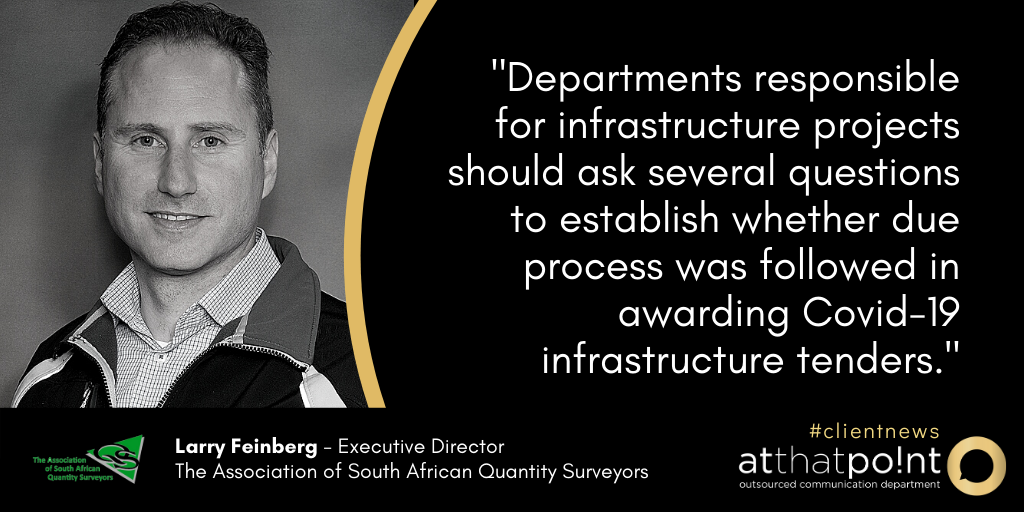|
The list of companies that were awarded contracts by government for the supply of goods and services related to the Covid-19 pandemic include details on personal protective equipment (PPE) contracts. Provincial expenditure disclosure reports however indicate that as much as – or even more – has been spent on infrastructure projects but very little detail is provided to compare these costs to industry norms.
From April to July 2020 Gauteng spent R2,112bn on PPE and R2,977bn on infrastructure. As at 27 July 2020 the reported expenditure for KwaZulu Natal amounts to R800mil on PPE and R1,139bn on infrastructure. The Western Cape report provides information on PPE expenditure only and not on infrastructure projects. These projects included upgrades and alterations to health facilities and education facilities as well as the establishment of field hospitals, quarantine and isolation facilities. The expenditure reports provide detailed information on the unit of measure, price per unit and quantity required on the procurement of PPE for contracts from as little as R1000. The reports however include very little detail on the specifications for the infrastructure projects and how they were procured. These details are used by those that assign tenders to benchmark quoted costs against prevailing market prices and Treasury norms. This comparison helps to identify inflated prices and related irregularities. However, on the infrastructure projects, only a single amount together with a very brief description of the work is provided. This lack of detail does not allow for a basis to benchmark these costs against market norms. It is therefore extremely difficult to determine whether government obtained the expected value from the infrastructure expenditure. Lack of understanding causes lack of outrage The skewed focus on the reported irregular expenditure on PPE is most likely due to a general lack of understanding of how detailed infrastructure procurement management and project delivery really is. It is for this reason that the Quantity Surveying profession is seeking responses to key questions that will expose any irregularities if applicable. According to the Association of South African Quantity Surveyors (ASAQS), a Quantity Surveyor is the member of the professional consultant team responsible for managing all financial aspects on construction projects from start to finish. In the public sector they are also responsible for preparing procurement documentation on behalf of organs of state. Quantity Surveyors ensure that tenders are awarded to building contractors at market related prices which are benchmarked against industry rates. They also verify that the work done by the contractors is based on actual performance before payment is released to the contractor. Government must caution against writing blank cheques for infrastructure projects In the Gauteng expenditure report 15 health infrastructure projects are listed without any names of contractors or of the core professional consultant team consisting of quantity surveyors, architects, engineers and project managers. In the KwaZulu-Natal Report infrastructure expenditure refers to contractors only. With no indication of the involvement of professionals in the documents available in the public domain it could easily be assumed that none were appointed. If this is indeed the case, then it is highly possible that the procurement and management of these projects lacked the required independent and professional oversight. This is especially concerning when expenditure on Covid-19 infrastructure exceeds that of total PPE procurement – without the same amount of public outrage. It is of utmost importance to the South African economy to ensure that Covid-19 infrastructure projects were awarded and completed in a fair, equitable, transparent, competitive and cost-effective manner even though emergency procurement was necessary at the time. Departments responsible for infrastructure projects should ask several questions to establish whether due process was followed in awarding Covid-19 infrastructure tenders. The answers provided to these questions should be reviewed by competent, registered built-environment professionals in order to determine “fit for purpose” decision-making and to identify any irregularities or non-compliance. The ASAQS, through its members and provincial chapters, is ready to assist investigative agencies to identify and quantify any fraud and corruption on Covid-19 infrastructure projects. ENDS EDITOR’S NOTE: For the sake of brevity we have excluded from the main body of this media release the list of questions departments responsible for infrastructure projects should ask to establish whether due process was followed in awarding Covid-19 infrastructure tenders. We include these questions below for your convenience:
MEDIA CONTACT: Stephne du Toit, 084 587 9933, [email protected], www.atthatpoint.co.za
0 Comments
Leave a Reply. |
Archives
July 2024
Categories
All
|


 RSS Feed
RSS Feed